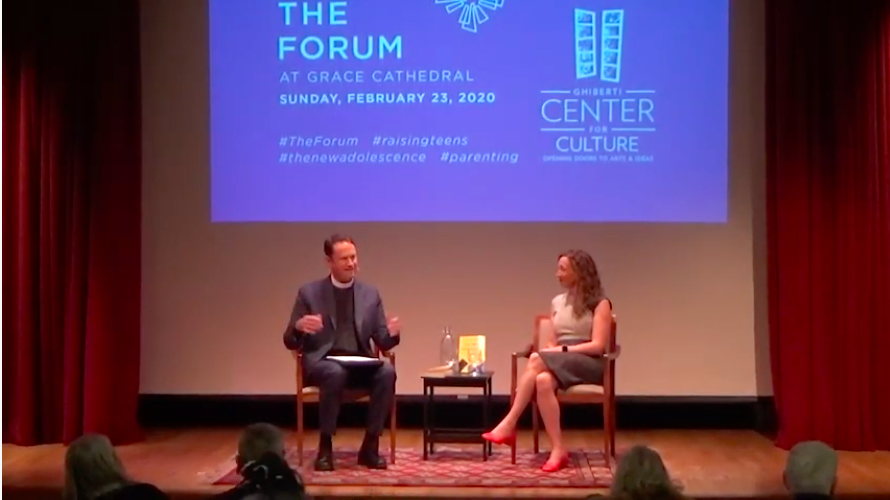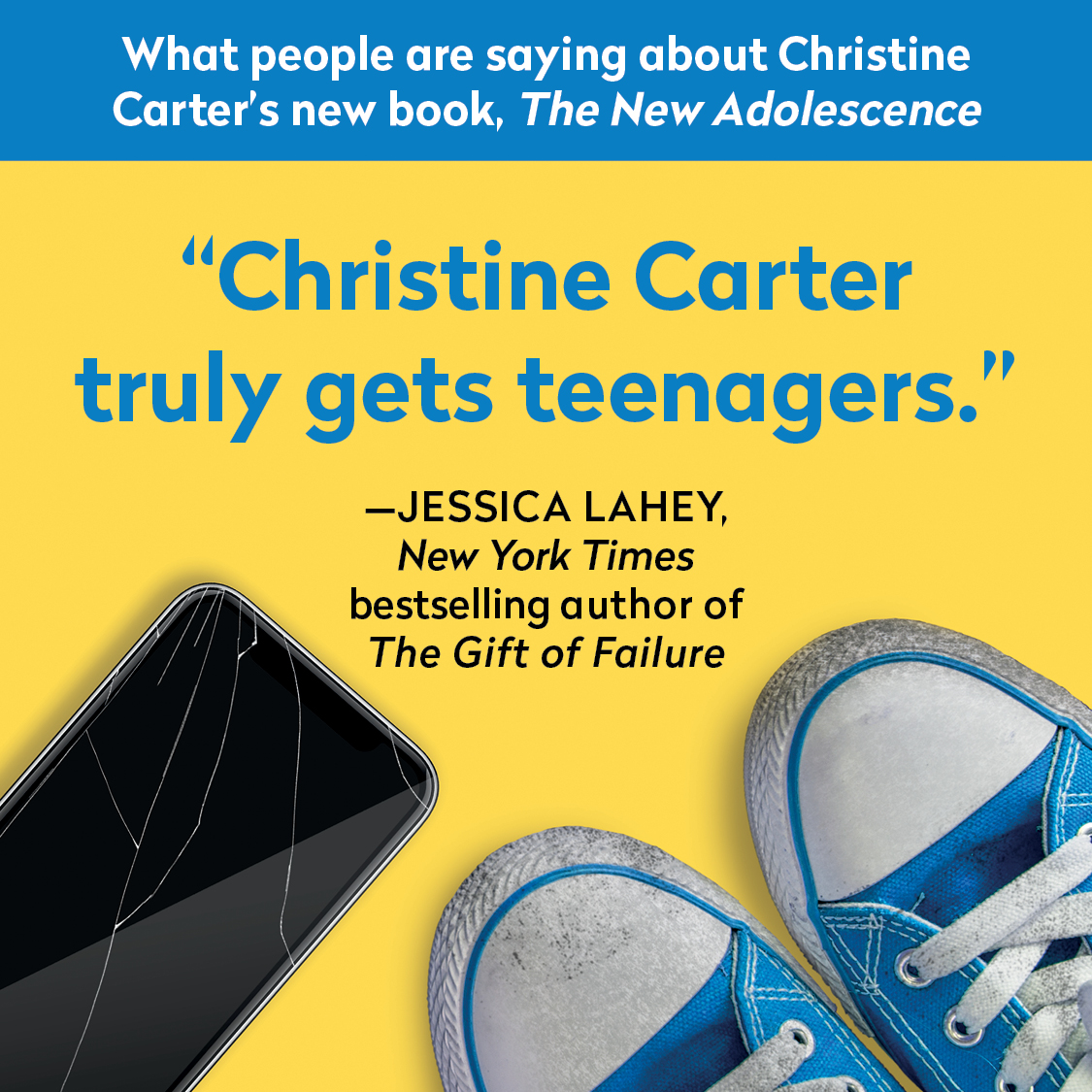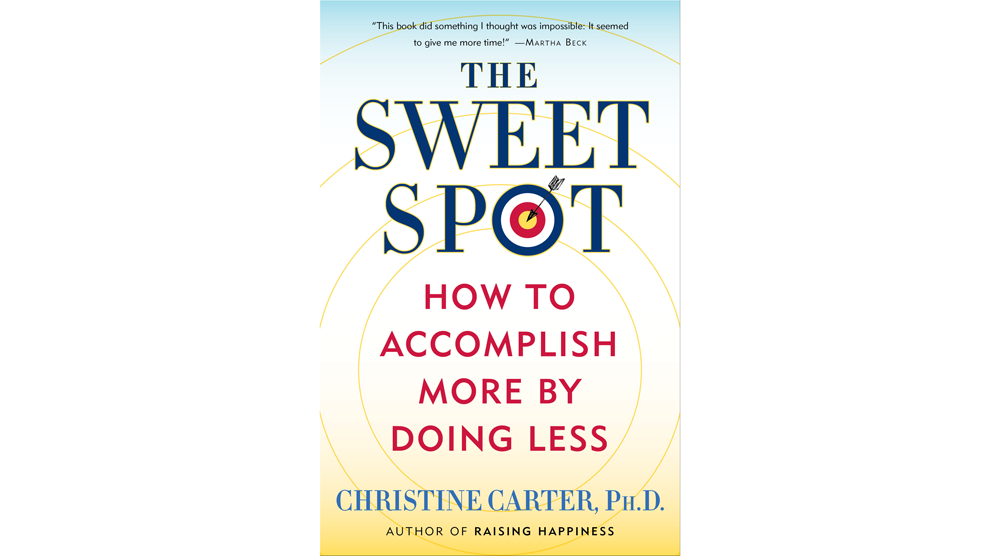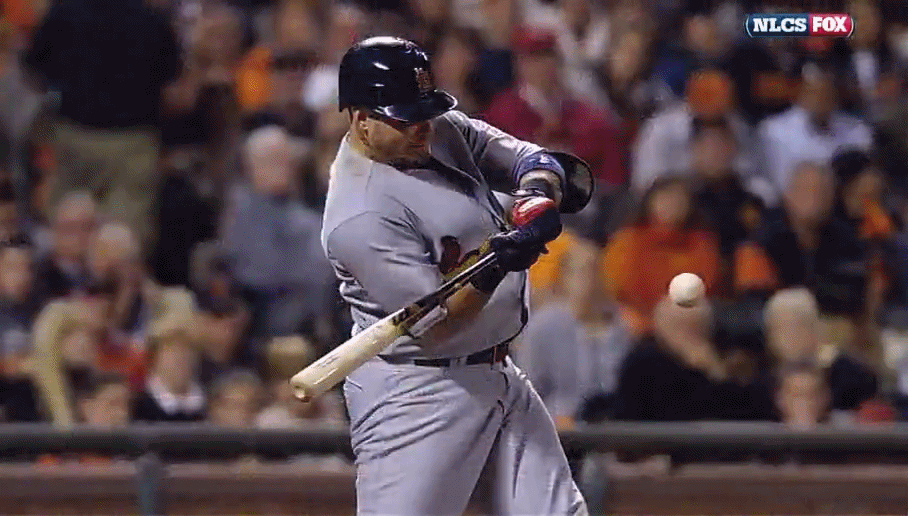Booklaunch highlight: Participating in the Forum last weekend at Grace Cathedral. I love Dean Malcolm Young; it was so fun to be with him again. He asked GREAT questions, as did the audience. I hope you enjoy the interview!


Booklaunch highlight: Participating in the Forum last weekend at Grace Cathedral. I love Dean Malcolm Young; it was so fun to be with him again. He asked GREAT questions, as did the audience. I hope you enjoy the interview!


The New Adolescence: Raising Happy and Successful Teens in an Age of Anxiety and Distraction launches today! Many of you have already pre-ordered it or are planning to attend a book event, and for that, I am profoundly grateful.
Have you been meaning to get a ticket to a book talk or pre-order the book? If you do it now, you’ll be helping me AND many others. How? I am donating everything I earn on pre-orders to Tipping Point Community. Located here in the San Francisco Bay Area, Tipping Point identifies and invests in the most effective anti-poverty solutions by funding a portfolio of poverty-fighting organizations.
Booksellers take note of a new title’s pre-orders as an indication of reader support and enthusiasm. Those who haven’t yet stocked The New Adolescence are likely to do so if pre-orders are strong. And booksellers are more likely to feature it in their stores or online during the launch week — which is exactly what we need. So I’m humbly asking you to pre-order the book, as an act of kindness and friendship (in addition to hopefully being a helpful book for you to read). I will do my best to return the favor by sending you free gifts.
In thanks for all that you do for me, we’ve put together a few bonus gifts for you. Click here to pre-order and then claim your gifts here!
Without you readers, there’s no gig for me here. I’m so, so, so grateful for you!
Lots of love,

I wrote this book because, like many parents, I was baffled by problems that didn’t exist when I was a teenager (like social media, sexting, and vaping). It’s a practical guide to:
The New Adolescence is filled with road-tested, science-based solutions for raising happy, healthy, and successful teenagers in this age of distraction, anxiety, and accelerated change.
“Mixing cutting-edge science with humor and personally earned wisdom, Christine Carter makes a convincing case that we need to step up our parenting with our teens. Fortunately, she also tells us how to do so in The New Adolescence in ways that seem not just possible in our busy lives, but deeply practical and empowering for both parents and adolescents.”
Daniel J. Siegel, MD
Bestselling author of Brainstorm
“The New Adolescence is a sane, informative, and helpful book that I will be gifting over and over. It has already made me a better parent—and a happier one, too.”
Jessica Lahey
New York Times bestselling author of The Gift of Failure
“Dr. Carter brings her wonderful blend of solid science, practical suggestions, and warm encouragement to the biggest challenge most parents face: raising teenagers these days. The New Adolescence is both deep and accessible, comprehensive and fast-paced, and honoring of adolescents and respectful of parents’ needs for reasonable authority.”
Rick Hanson, Ph.D.
Author of Resilient, Hardwiring Happiness, and Buddha’s Brain
“Christine Carter has spent the last two decades honing the art and studying the science of effective parenting. This hands-on book is the guide every parent of teenagers needs.”
Susan Stiffelman, MFT
Author of Parenting Without Power Struggles
“With solid research, relatable storytelling and practical strategies and tactics, Christine Carter provides teens, parents and families with the lifelines they need to create meaning, fulfillment and the human connection that makes real life worth living.”
Brigid Schulte
Author of Overwhelmed and director of The Better Life Lab at New America

“Wow. Ugh. That’s amazing!”
This is the usual wide-eyed response when people hear that I have four teenagers. Sometimes people grimace, like the mere thought of it is a bitter pill. They are thinking, I know, that teenagers are hard, which, of course, they can be. Everyone assumes I must be insanely busy, or maybe just a little insane, and that raising four teenagers must be nearly impossible.
 These thoughts occur because many teenagers tend to be either terribly disorganized, requiring constant nagging, or tightly wound, perfectionistic, and in need of constant therapy. There’s also all that new neuroscience showing, unfortunately, that the brain regions that help humans make wise choices don’t mature until kids are in their mid 20s, and that many potentially life-threatening risks become more appealing during adolescence while the normal fear of danger is temporarily suppressed. Knowing these things can make it hard for us parents to relax.
These thoughts occur because many teenagers tend to be either terribly disorganized, requiring constant nagging, or tightly wound, perfectionistic, and in need of constant therapy. There’s also all that new neuroscience showing, unfortunately, that the brain regions that help humans make wise choices don’t mature until kids are in their mid 20s, and that many potentially life-threatening risks become more appealing during adolescence while the normal fear of danger is temporarily suppressed. Knowing these things can make it hard for us parents to relax.Though teenagers can be hard to parent, the good news is that parenting teenagers is in many ways a hell of a lot easier than raising little kids. For this to be the case, however, our parenting needs to shift. Here are the three big shifts that parents of teenagers need to make to survive their kids’ adolescence.
When our kids are little, we have to manage pretty much every aspect of their lives. We set bedtimes, plan meals, and make doctor’s appointments. We arrange carpools and make all major decisions: where they will go to school, if they will go to camp, and where we’ll go on vacation. And when our kids are little, for the most part, they appreciate having involved and loving parents. It’s great having someone else manage your calendar and get you to your activities (mostly) on time.
But once kids reach adolescence, they need to start managing their own lives, and they do tend to fire us as their managers. Parents who are too controlling—those who won’t step down from their manager roles—breed rebellion. Many kids with micromanaging parents will politely agree to the harsh limits their parents set with a “yes, sir” or a “yes, ma’am” attitude, but then will break those rules the first chance they get. They don’t do this because they are bad kids, but because they need to regain a sense of control over their own lives.
The answer, according to neuropsychologist William Stixrud and long-time educator Ned Johnson, authors of The Self-Driven Child, is to hand the decision-making reins over to our teens. You read that right: By adolescence, we parents need to (take a deep breath and) let them make their own decisions about their lives. It’s not that we never say no anymore. Nor do we stop enforcing our family rules. It’s that we start to involve teens more in creating the rules, and we let them make their own decisions—which they are going to do anyway.
Letting our kids become the primary decision makers does NOT mean that we become permissive, indulgent, or disengaged. It does mean that the quality—if not the quantity—of our support shifts. We give up our role as their chief of staff and become more like life coaches. We ask questions, and provide emotional support.
It’d be great if we parents could just download information to our teens—say, about sex and drugs—and know that they were going to use that information to make good decisions.
But giving teenagers a lot of information isn’t an effective way to influence them anymore. Interesting research on this topic shows that what is effective for elementary school children—giving them information about their health or well-being that they can act on—tends to be mostly ineffective for teenagers.
This is because adolescents are much more sensitive to whether or not they are being treated with respect. The hormonal changes that come with puberty conspire with adolescent social dynamics to make teenagers much more attuned to social status. More specifically, they become super touchy about whether or not they are being treated as though they are high status.
In the teenage brain, the part of themselves that is an autonomous young adult is high status. The part of them that is still a kid who needs our support is low status. They might be half independent young adult, half little kid, but they are hugely motivated to become 100 percent autonomous…even if they do know, on some level, that they still need our support and guidance.
When we give our adolescents a lot of information, especially when it is information that they don’t really want or that they think they already have, it can feel infantilizing to them. Even if we deliver the information as we would to another adult, teenagers will often feel disrespected by the mere fact of our instruction.
So, when it’s time to bring up the topic you want to influence your teen about, speak as you would to someone with the highest possible social status—someone you really, really respect. (I have to literally imagine that person in my head, and then imagine both the tone and the words I would use with that person.) Remember, if your teen feels disrespected, nagged, spoken down to, pressed upon, or infantilized, all bets are off.
Remember what you used to talk about with your kids before they hit puberty? There are days when I’d give anything to just be able to talk again about favorite foods and favorite colors and the tooth fairy. It isn’t that every conversation was easy when they were young, but I rarely felt the kind of discomfort I now feel while talking to my kids about things like sex—or even their college applications. What starts as a casual conversation can quickly become an emotional minefield. It’s hard not to let our own agendas creep in. And it can be really hard to manage our own big feelings about things.
Talking with teenagers about their lives can be stressful. But teenagers today are dealing with some really hard stuff, and we parents need to create safe spaces for our teens to talk about the hard things.
This takes a lot of courage. The simplest way to increase our ability (and, frankly, willingness) to have uncomfortable conversations with our teens is to practice doing it in baby steps. Instead of thinking about having a “big talk,” broach a difficult topic in short observations and simple questions. Let teens lead; our real value comes when we listen rather than instruct. Even when we have a lot to say, it’s more important to give them a chance to speak, to work out what they are thinking in a low-risk environment. Practice staying calm despite the discomfort. Keep taking deep breaths. Keep relaxing your shoulders. Notice your discomfort, and welcome it. It’s nothing to be afraid of.
As hard as it might be for us to watch, our teenagers are going to make mistakes. When they do, our anxious over-involvement won’t help. What will help, though, is our calm presence. This is more good news, because it is far more enjoyable to practice calm presence than it is to freak out.
Above all, we’ll do well to remember that their lives are their lives. It’s their journey, not ours. Our role is not to steer them through life like we would marionettes, but rather to help them feel seen, and to help them feel safe. For that, we need only to coach instead of manage, listen instead of instruct, and breathe through our discomfort.
This essay is adapted from The New Adolescence: Raising Happy and Successful Teens in an Age of Anxiety and Distraction (BenBella Books, 2020, 230 pages).
If you’re in the Bay Area, we hope you’ll join us for the launch at the Hillside Club on February 20, 2020! Find more information about my book events here.

Guess what? My book, The Sweet Spot: How to Accomplish More By Doing Less, is going to be available in paperback SO SOON on Amazon, Barnes and Noble, and at independent booksellers.
(Is that a new subtitle? Why yes, it is! You are very observant!)
The Sweet Spot contains the answers I wish I’d had many years ago about what leads to a successful and joyful life, all based on scientific research.
What is the “sweet spot,” you ask?
The sweet spot is that place where our greatest strengths and our greatest personal power overlap with where we find ease, where there is little resistance or stress.
I’ve long struggled with the ease piece of the sweet spot. I’ve developed my strengths, but I tend to “hamster wheel” when I’m too tense or tired. Like a baseball player, I know that I can “get hits” outside of my sweet spot, but my metaphorical bat (my body and brain) tends to bend or even break. Like the bat in this slow motion video:

In The Sweet Spot, my trials and errors are your reward. From time-saving micro-habits to bigger picture shifts that convert stress into productive and creative energy, The Sweet Spot shows you how to:
The Sweet Spot is loaded with practical tips (and fun stories) from my own experience road-testing the strategies.
I’ve been humbled by the warm reviews of my book:
“Dr. Christine Carter’s The Sweet Spot illuminates the simple and sustainable path toward a precious and happy balance.” – Deepak Chopra
“A breath of fresh air…Based on personal experiments with living life in what she calls the ‘pressure cooker,’ Dr. Carter offers advice in easily digestible nuggets.” – Working Mother
“This book did something I thought was impossible: it seemed to give me more time. In this age of overstuffed schedules, that’s about as good as self-help advice can get.” – Martha Beck, PhD, Oprah’s life coach
“Actionable ways to balance your life, your health, and your career. This book is packed with smart advice and hard-earned wisdom.” – Inc.
“Funny, intimately honest, and so practical—Dr. Carter pulls pure gold out of studies on the brain and happiness.” – Rick Hanson, PhD, author of Hardwiring Happiness
I’d love for you not to buy The Sweet Spot on June 6th, when the paperback is released. Instead, please pre-order the paperback now. Why?
Because all pre-orders ship the same week, which makes a book’s weekly sales huge. And that often is enough for a book to hit a best-seller list, which then, if the book is good, can become a self-fulfilling prophecy–readers that didn’t know about The Sweet Spot before will now see the book on a bestseller list! Booksellers also tend to take note and many will feature the book in their stores, or online.
So I’m humbly asking you to pre-order the paperback, as an act of kindness and friendship (in addition to hopefully being a fun and gratifying book for you to read). I will do my best to return the favor by sending you loads free gifts (see below)!
The Sweet Spot has received over 50 five-star reviews on Amazon. Amazon seems to treat books with 100 or more five-star reviews differently, suggesting it to people that might like it. So if you’ve already read the book and loved it, I would be further indebted to you if you were to leave a 5 Star review on Amazon. And I’ll also send you all the gifts!!
In thanks for all that you do for me, we’ve put together a bunch of exclusive stuff just for you. I will send most of these to you no matter what you decide to do. At the same time, I’m suggesting different gift levels. 🙂
Pre-order 1 book and/or leave an Amazon review
Click here to pre-order your copy or here to leave an Amazon review, and then claim your bonuses here!
Pre-order 2-9 copies of the book
If you have a few friends, family members, or co-workers that you’d like to give The Sweet Spot, whoo-hoo! I’m thrilled and honored. As thanks, I’ll send you everything listed under level one, and also:
Click here to pre-order your copies and claim your bonuses.
Pre-order 10 or more copies of the book
DANG, you are good. THANK YOU for even thinking about giving my book to so many people. I will happily send you everything listed above, PLUS:
Click here to pre-order 10 copies and claim your bonuses.
Without you readers, there’s no gig for me here. I’m so, so, so grateful for you!
Lots of love,

Christine
This is how we usually behave — we see a reflection of our less-than-perfect traits in others, and rather than realizing that we are seeing this in order to change and perfect ourselves, we stay focused on the faulty mirror.”
— Michael Berg